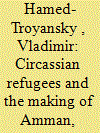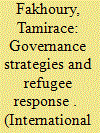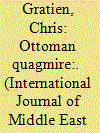|
|
|
Sort Order |
|
|
|
Items / Page
|
|
|
|
|
|
|
| Srl | Item |
| 1 |
ID:
155941


|
|
|
|
|
| Summary/Abstract |
In the final decades of Ottoman rule, several waves of refugees from the Russian Empire's North Caucasus region immigrated to Transjordan, where they founded Amman and other agricultural villages. This article examines the economy of Amman in its formative years as a Circassian refugee settlement. By exploring connections between North Caucasian refugees, Syrian and Palestinian merchants, and Transjordanian urban and nomadic communities, this study posits refugees as drivers of economic expansion in the late Ottoman period. I argue that the settlement of North Caucasian refugees and their active participation in the real estate market in and around Amman contributed to the entrenchment of the post-1858 property regime in Ottoman Transjordan. Through a study of an upper-class Circassian household and its legal battles, this article also illustrates the rise of refugee elites who benefited from the commodification of land and the construction of state-sponsored infrastructure in the late Ottoman Levant.
|
|
|
|
|
|
|
|
|
|
|
|
|
|
|
|
| 2 |
ID:
155945


|
|
|
|
|
| Summary/Abstract |
This article discusses how the Lebanese state has responded to displacement from Syria (2011–17), and how the resulting policy formulation processes and discourses have constructed the relationship between the hosting state and the refugee. It focuses especially on how this small state has negotiated its politics of reception and choice of policy tools amid dysfunctional institutions and political disputes. To this end, it uses the lens of Lebanon's model of sectarian power sharing to understand the polity's response to mass displacement. This process has been structured by the defining dynamics of the country's politics of sectarianism: slack governance, an elite fractured model, and a politics of dependence on external and domestic nonstate actors. The Lebanese model offers broader insights into types of coping mechanisms that emerge in the context of forced migration, notably when a formal refugee regime is absent. The article contends that states lacking a legal asylum framework and grappling with various governance hurdles are likely to draw on the repertoire of their political regime to deal with displacement.
|
|
|
|
|
|
|
|
|
|
|
|
|
|
|
|
| 3 |
ID:
155943


|
|
|
|
|
| Summary/Abstract |
In late 2015, approximately 2,000 Syrian asylum seekers made their way into Norway via the Arctic passage from Russia. What ensued are “global moments,” breakthrough events that have reshaped lives and futures for both the refugees and those who aided them, and it is the latter group on which this article focuses. As refugees began arriving in Arctic Norway, Refugees Welcome to the Arctic, an ad hoc grassroots organization, was formed to assist them. This group of ordinary people, most of them with no previous humanitarian experience, took action in defiance of Norwegian government policies, and providing food became the focus of their efforts. Refugees Welcome to the Arctic members often described being motived to act by their own traumatic memories of the region's experience of World War II, a time of deprivation and brutality suffered at the hands of the retreating German army. Food, as an enactment of compassion, is shown to be a powerful means through which people connect in very personal, concrete ways to the humanitarian enterprise.
|
|
|
|
|
|
|
|
|
|
|
|
|
|
|
|
| 4 |
ID:
155940


|
|
|
|
|
| Summary/Abstract |
During the late Ottoman period, a large influx of migrants and the expansion of cultivation created opportunities for new settlements in the countryside of Anatolia, Greater Syria, and Iraq. However, settlement often brought misery to newcomers in the form of malaria, especially when it occurred in the lowlands of the Mediterranean. This article traces the contours of the encounter with malaria that arose out of settlement, offering an overview of how Ottoman state and society confronted the conundrum of the swamp and examining the impact of this confrontation on local political economies. It demonstrates that swamps and malaria were a significant concern for late Ottoman state and society, and that policies adopted to address malaria sometimes facilitated the creation of large estates in the countryside of the Mediterranean littoral.
|
|
|
|
|
|
|
|
|
|
|
|
|
|
|
|
| 5 |
ID:
155946


|
|
|
|
|
| Summary/Abstract |
This article explores the ways in which refugee and host experiences of displacement in Jordan between 2010 and 2013 were articulated in a socioeconomic register that coincided with, but was also independent of, both state biopower and historical cross-border regionalisms. I argue that this register became salient due to a shared understanding of everyday life as characterized by what I term hunger, a state of depredation where “people eat people” to attain their own well-being. In pursuing this argument, the article has two goals: to show how Iraqis and Jordanians negotiated the complexities of living together in hunger by censuring individuals—locals and foreigners, rich and poor—who contributed to producing hunger rather than to alleviating it, and by consciously resisting the corrosive effects of hunger on social relations; and, more generally, to challenge universalizing understandings of refugee experiences according to which local tensions between refugees and hosts are derivative of a globalized antiforeigner discourse.
|
|
|
|
|
|
|
|
|
|
|
|
|
|
|
|
| 6 |
ID:
155942


|
|
|
|
|
| Summary/Abstract |
In the immediate aftermath of World War I, the newly formed League of Nations saw Middle Eastern refugees—particularly displaced Armenians and Assyrians scattered in camps across the Eastern Mediterranean—as venues for working out new forms of internationalism. In the late 1940s, following the British abandonment of the Palestine Mandate and the subsequent Zionist expulsion of most of the Palestinian Arab population, the new United Nations revived this concept of a refugee crisis requiring international intervention. This paper examines the parallel ways in which advocates for both the nascent League of Nations and the United Nations made use of mass refugee flows to formulate arguments for new, highly visible, and essentially permanent iterations of international authority across the Middle East.
|
|
|
|
|
|
|
|
|
|
|
|
|
|
|
|
| 7 |
ID:
155944


|
|
|
|
|
| Summary/Abstract |
This article examines the figure of the misafir (guest) as it personifies the combined domains of everyday and institutional hospitality in Hatay, a contested border province annexed to Turkey from French Mandate Syria in 1939, and home today to over 400,000 displaced Syrians. Based on fieldwork conducted between 2010 and 2012 in Hatay's administrative capital, Antakya, I focus on the perspectives of the region's bilingual (Turkish-Arabic) Jewish and Christian populations about the official misafir status of the first Syrian arrivals. I argue that the sudden transformation of Syrians from familial misafirs to governmental misafirs in the early days of the Syrian conflict ruptured the hierarchical domains of reciprocity that have historically shaped the cross-border relations between these communities. In this process, Antakya's religious minorities recognized and negotiated the limits of their own residence, difference, and citizenship in Turkey, and invoked the lived practices of hospitality that exist beside but also transcend ethnoreligious and national identities. By examining how historical articulations of religious and national difference along the Turkish–Syrian border are entwined with the figure of the misafir at the interpersonal level, this article contributes to debates on hospitality in scholarship on the Middle East and in migration literature.
|
|
|
|
|
|
|
|
|
|
|
|
|
|
|
|
|
|
|
|
|